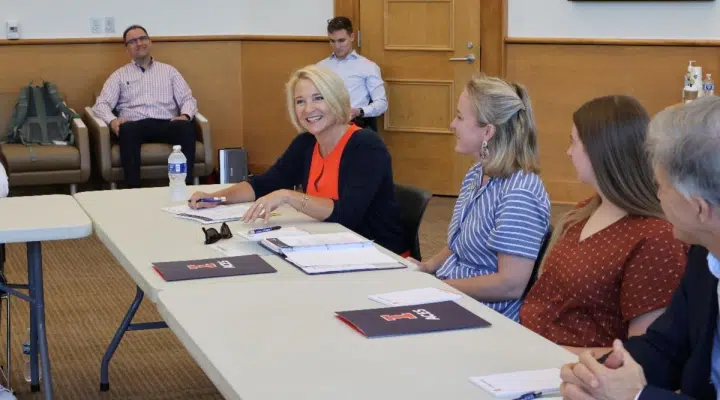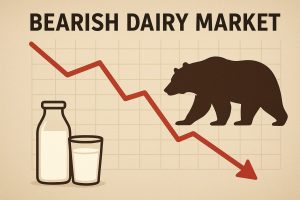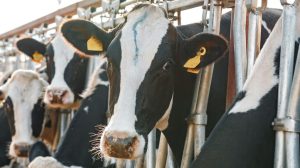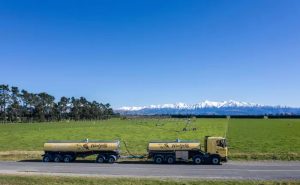
Agricultural innovations can enable farmers to increase production with limited resources.
U.S. Congresswoman Nikki Budzinski met Aug. 28 with agricultural scientists at the University of Illinois Urbana-Champaign and leaders from Farm Journal Foundation to discuss how public support for agricultural research and development can benefit global food and nutrition security.
The meeting included a roundtable discussion with the university’s Feed the Future Soybean Innovation Lab about how agricultural innovations can enable farmers to increase production with limited resources to strengthen food supply chains and benefit national security. As Congress works to craft the next Farm Bill, discussions about public support for agricultural innovation are particularly important, especially as the world faces a worsening food crisis. A new bill recently introduced by Congresswoman Budzinski, the America Grows Act of 2023, would also have a significant impact by increasing funding for agricultural research.
“Food security is national security – and family farmers in Central and Southern Illinois play a vital role in feeding our nation and folks around the world,” Congresswoman Budzinski said. “As we work to pass the next Farm Bill, I’m focused on ensuring that we make strong investments in agricultural research that ensure institutions like the University of Illinois can remain a global leader in 21st century ag innovation. I’m grateful to the University and Farm Journal Foundation for bringing us together today and leading the way toward a bright future for those who feed and fuel our families.”
Participants in the event included Congresswoman Budzinski; Farm Journal Foundation Farmer Ambassador Heather Hampton-Knodle; Alex Winter-Nelson, Acting Associate Dean of Research at the College of Agricultural, Consumer and Environmental Sciences at U. of I.; Peter Goldsmith, Director of the Soybean Innovation Lab; Michelle da Fonseca Santos, Assistant Director of the Soybean Innovation Lab; Brian Diers, Deputy Director of the Soybean Innovation Lab; and Harun Murithi of the U.S. Department of Agriculture’s Agricultural Research Service’s Research Participation Program, the Oak Ridge Institute for Science and Education.
During the roundtable discussion, the Soybean Innovation Lab shared research advancing soybean development in Africa. The lab is supported by Feed the Future, a U.S. whole-of-government initiative that supports agriculture and local food systems in developing countries to address the root causes of hunger and poverty. Public funding for agricultural research supports Feed the Future programs and other impactful work at universities, government laboratories, and international research institutions such as CGIAR.
“The Soybean Innovation Lab — and its large network of scientists and partners across 31 countries and 216 locations — brings agricultural innovations at scale to transform seed systems and agricultural productivity, and by doing so, ensures food security, greater resilience, and poverty reduction,” said Peter Goldsmith, Director of the Soybean Innovation Lab, part of the College of ACES at U. of I.
Agricultural research is particularly important today, as global hunger and malnutrition have risen significantly due to challenges including the conflict in Ukraine, extreme weather events driven by climate change, and the COVID-19 pandemic. New innovations can enable farmers to become more resilient, increase crop production (including healthy foods), preserve natural resources, and adapt to changing climatic conditions.
Agricultural research has one of the highest returns of any public investment, returning on average $20 in benefits for every $1 invested, according to data from the U.S. Department of Agriculture. In spite of its benefits, public funding for agricultural research has been declining over the past two decades. The America Grows Act would increase funding for agricultural research by 5 percent annually on an inflation-adjusted basis at the four main agricultural research and statistical agencies at the USDA for the next 10 years.
Innovation is particularly important for Illinois, which is one of the top agricultural producers in the country. Agriculture contributes over $51 billion annually to the state’s economy and supports over 482,000 jobs, according to the Illinois Farm Bureau.
“We as a college are solving the world’s greatest agricultural challenges through discipline-defying research,” said Germán Bollero, Dean of the College of ACES. “Investments are needed to spur agricultural innovations that will safeguard our food supply and propel economic prosperity across our state, nation, and the world.”
Agricultural research undertaken in the public sector, such as that being conducted at the University of Illinois, has an important role to play in strengthening global food and nutrition security. While private-sector research investments have a significant impact, the public sector can support early stage research to pave the way for important long-term innovations. Public investment can also support comparatively under-explored areas such as animal health, environmental, and food safety research, and unlock innovations for smallholder farmers overseas, helping developing countries feed themselves.
“Farmers play a critical role in feeding, clothing, and fueling the world, but we must be able to innovate to continue meeting rising global demand,” said Heather Hampton-Knodle, an Illinois farmer and Farmer Ambassador with Farm Journal Foundation. “Investments in agricultural research and development are investments in the future. Agricultural technologies developed in the U.S. benefit American farmers, as well as farmers in developing countries where hunger and malnutrition are significant challenges.”
— Farm Journal Foundation




















